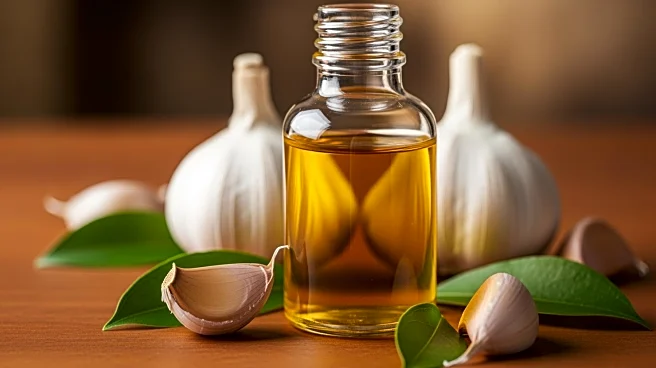What's Happening?
A recent study conducted by researchers from the University of Sharjah has revealed that garlic extract may serve as a natural alternative to chlorhexidine, a widely used antiseptic mouthwash. Published in the Journal of Herbal Medicine, the study suggests
that garlic-based mouthwash can match the antimicrobial effectiveness of chlorhexidine, although it may cause more discomfort. The research involved a systematic review of clinical settings, comparing the performance of garlic extract with chlorhexidine. The study followed rigorous guidelines to ensure reliability and transparency, including the Preferred Reporting Items for Systematic Reviews and Meta-analyses 2020 and the PICO framework. The review included randomized controlled trials and clinical studies, indicating that higher concentrations of garlic extract can reduce microbial activity similarly to chlorhexidine. Despite some side effects like burning sensation and unpleasant odor, garlic extract presents a viable alternative in certain contexts.
Why It's Important?
The findings of this study are significant as they offer a potential natural alternative to chemical mouthwashes, which are associated with side effects and concerns over antimicrobial resistance. Garlic extract, known for its natural antimicrobial properties, could provide a safer option for oral care, reducing reliance on synthetic agents like chlorhexidine. This development could impact the oral care industry by introducing more herbal-based products, appealing to consumers seeking natural solutions. Additionally, the study highlights the need for further research to confirm garlic's efficacy in dental practice, potentially leading to new product innovations and market expansion. The global garlic extract market, valued at over $15 billion, could see increased demand as consumers become more aware of its benefits.
What's Next?
Further clinical research is necessary to confirm the effectiveness of garlic extract as a mouthwash alternative. Researchers emphasize the need for larger sample sizes and extended follow-up studies to improve clinical applicability. If proven effective, garlic-based mouthwashes could become more widely available, potentially influencing dental care practices and consumer preferences. The study also calls for standardization in clinical methods to ensure consistent results across different contexts. As the oral care industry explores natural alternatives, companies may invest in developing new products that incorporate garlic extract, potentially leading to increased competition and innovation in the market.
Beyond the Headlines
The exploration of garlic extract as a mouthwash alternative raises broader questions about the role of natural remedies in modern healthcare. As consumers increasingly seek herbal solutions, the healthcare industry may need to adapt by integrating more natural products into mainstream practices. This shift could challenge existing regulatory frameworks, requiring updates to accommodate new types of products. Additionally, the study underscores the importance of evidence-based research in validating the efficacy of natural remedies, highlighting the need for collaboration between scientific communities and industry stakeholders to ensure safe and effective healthcare solutions.
















